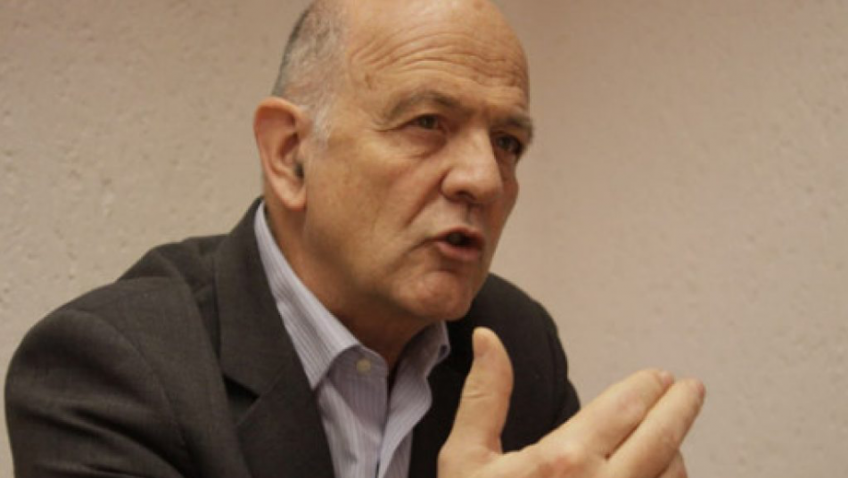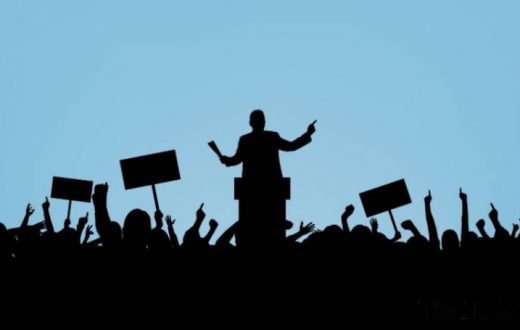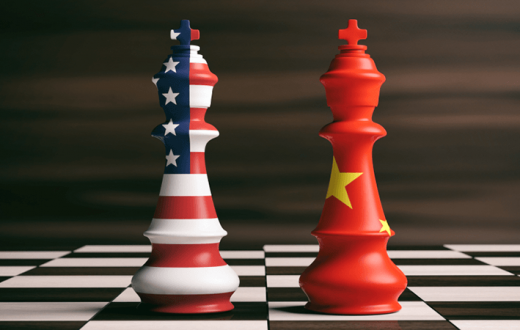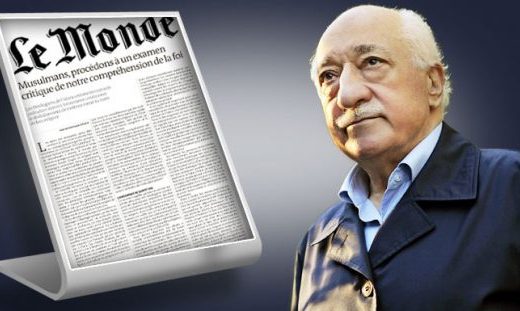Manuel Alcántara Sáez is professor at the University of Salamanca (Spain) and a founding member of FLACSO-Spain. Bachelor in Political Science and Sociology (1976) and Ph.D. in Political Science (1984) from the Universidad Complutense de Madrid. Professor of Political Science and Administration of the University of Salamanca since 1993, he promoted the development of the Ibero-American and Portuguese Studies Institute of the same University, now the Ibero-American Institute, of which he was director until 2007. He also served as vice-chancellor of International Relations and Cooperation of the University of Salamanca (2007-2009). He holds an honorary doctorate from the University of San Martín in Argentina, as well as the Medal of the Order of Bernardo O’Higgins, awarded by Chilean President Michelle Bachelet.
We share this interesting and extensive interview conducted by Anthony Medina Rivas Plata (political scientist), Patricio Gomez Talavera (historian) and Freddy Alpalá Cuesta (Undergraduate student from Political Studies and Conflict Resolution at University of Valle in Colombia
Anthony Medina: Manuel, thank you very much for the opportunity. First we would like to discuss with you the current relevance of Political Science as an academic discipline in today’s Latin America. In recent years we have seen how the number of Congresses organized by national and international associations has multiplied, such as the Latin American Political Science Association (ALACIP), the Latin American Studies Association (LASA) and others. Do you feel that these events generate a real contribution to the discipline or, instead, you see a set of commonplaces that are repeated continuously and need to be overcome?
Manuel Alcantara: Undoubtedly there is an important evolution in the last 20 years. The Political Science in Colombia was reduced to two or three Universities; nowadays, there is an expanding offer throughout the country. Political Science, as a global discipline, has certain countries in which it has been developed more against others in which evolution has been less; And that also happens in the Latin American world. In principle it is necessary to examine the progress both at the level of teaching (in undergraduate and postgraduate), and in research (basic and applied); two worlds that do not necessarily always go in the same path. There are already certain established lines for teaching around the world, while there can be wide differences in the field of research. It should also be considered that there is an important correlation between the level of per capita income in a country and the emergence of Political Science schools, this is because there is a greater empowerment and interest of citizens in studying public affairs when income exceeds a certain level then a market of ‘producers’ and ‘consumers’ of research and information in Political Science.
AM: In that sense, can you consider that Political Science is closely linked to democracy as a procedure and as a way of government?
MA: The democratic factor is key. For example, Saudi Arabia and the Gulf countries have some schools of Management and Public Administration from a very ‘technical’ point of view, that is, with the aim of training their staff of officials with the aim of performing preset functions from the government, but without further reflection or critical analysis on its bases. It is true that Sciences Po and several North American Universities have offices there too, but it must be remembered that these countries allow this only insofar as they are facilitated by training their elites. In these countries, without a doubt, they receive a theoretically very solid academic formation, but always ignoring basic aspects about the functioning and exercise of power, which is the root of Political Science.
AM: Would you then see wide differences between doing Political Science from Europe and Latin America?
MA: It is a complicated issue, since not only there are differences of intellectual character, but personal. As in other aspects of human life, in the academic world there are also personal jealousies and misgivings that go beyond the professional. After knowing some of the existing academic worlds in Europe, I can tell you that they are very hybrid and mestizo. This idea of a ‘Political Science of the North’ in front of a ‘Political Science of the South’ has much misunderstanding. No doubt there are problems that require a method and a discipline of analysis; but it is important to make a distinction between the disciplinary development “in itself” and the discursive “class struggle” that this development can generate (colonialists vs. postcolonials, aggressed vs. acholados, etc.). Ultimately, the substantive discussion is not only about who publishes books, but who wins the places within the spaces offered by Universities, Institutes or Research Centers, as well as the salaries that are assigned. In Europe, Latin America and the rest of the world, most people always want to have the best position and the best salary, that’s right. If my former students of Political Science in Madrid had had better teaching positions, perhaps they would have focused more on their teaching and research work than on their PODEMOS membership. The end of the last decade was a very difficult context in which squares were scarce and teaching activity began to be proletarianized. This is different from what happened in the 80s, for example, where there were many colleagues at the Complutense University of Madrid who reached the highest teaching position at 32 years of age. It was a time of great abundance, no doubt.
There is another more epistemological discussion, about the type of Political Science we do and the paradigm we handle, and in that sense there is a struggle for excellence and for having the recognition of being among the best political scientists. This is not a competition for who publishes more, but for the explanatory quality of the generated publications. The problem arises, I repeat, at the moment of defining this. Who is the best political scientist? The most cited? That could be a criterion, however, another problem arises, since the realities of each country are different (due to their culture, idiosyncrasy, etc.), the theoretical frameworks to interpret these realities should also be so. Can we talk about a Peruvian or Colombian Political Science against, for example, a Korean Political Science? That is a valid and recurring question. If I were going from Madrid to Lima to talk about the Peruvian reality, a colleague there could tell me: “Do not try to explain what is happening in Lima, because we are the ones who live here. You explain what happens in Madrid. ” I do not accept that position in the current world. I can be more up to date with what happens in Lima better than you, as I read a number of newspapers every day, plus I have a better network of contacts that tells me what is happening. And, in addition to that, there is the methodological perspective that I can adopt to confront a certain problem whose range is universal. In that sense, the speed of online communications has been erasing those limitations that were previously clearly determined by geography. What matters today is the type of theories, analysis methods and data that you use.
AM: Although it is very common to talk about the ‘crisis of democracy’ and its effects, it is undeniable that in a large part of the world there is a ‘populist conjuncture’ in which the old party systems are criticized under the same script; following progressive tendencies on one side, and clearly reactionary on the other. On one side PODEMOS, SYRIZA or Bernie Sanders, and on the other, Marine Le Pen, Geert Wilders, Golden Dawn or Donald Trump. And while there are many differences between both sides, they also share a set of similarities with respect to the undeniably economic character of the political crisis. What to do about it?
MA: The democratic political system is the only one that erodes itself; because it is the only one that is permanently open to criticism and questioning. On the one hand, that is the wonderful thing about democracy. Remember Voltaire when he spoke about freedom of thought and said that democracy was the only system where democracy was allowed to be criticized. On the other hand, democracy allows for clearly antisystem elements, such as Donald Trump or Marine Le Pen; and it would be enough to remember that Adolf Hitler came to power in Germany through democratic mechanisms.
Regarding this, although democracy has its own instruments to purge this class of elements, sometimes these are not enough. If there had not been World War II, Hitler would probably never have left power in Germany. I do not know how the government of Nicolás Maduro will end, however, Maduro has exhausted the possibilities of democracy to such an extent that the emergence of regenerative mechanisms is no longer allowed. There are no longer democratic signs in the country because Maduro has suffocated them all; as Hitler did at his time.
I am not comparing them, because Hitler or Stalin were totalitarian leaders, and we must be very clear about the difference between totalitarianism and authoritarianism, as Hannah Arendt pointed out. For example, as Juan Linz warned, Franco’s regime was authoritarian, but not totalitarian. Franco in Spain allowed certain nuances of pluralism within his regime that could eventually flourish or not, while Hitler had to lose the war to abandon power. Another thing I want to highlight, and perhaps today’s young people do not notice so much, is that the radical changes that are taking place in the world start to get out of the manuals and textbooks of those who studied politics 30 years ago. I would be ashamed to go and dictate a course of Political Parties and retell the story from the point of view of what Sartori or Duverger wrote at the time. No doubt they are still valid and interesting and students have to know them, but there is another reality. In Peru, for example, that is very clear, and in fact Peru has been an ‘advanced’ country in that sense
because there disappear political parties in 1990. The ‘Fujimori phenomenon’ has been so devastating that they have not returned to regenerate political parties since then. After the fall of Fujimori, all the successive governments have come from different political parties, very volatile and relatively weak, so it is not perceived that this will change. What is the use in Peru of talking about political parties within the ‘Sartorian’ tradition? It serves very little. Likewise, the political party created by Emmanuel Macron has nothing to do with the historical tradition of the political parties in France.
PGT: In 2007-2008, in the United States there was a very strong criticism towards economists for their role in not seeing the crisis. Can something similar be happening today in European political science in the current context, or has a better interpretation been achieved?
MA: I think that political scientists are more modest than economists. I do not know any political scientist who poses scenarios of ‘this is going to be like this’, among other things, because that would not mean making money, while economists making their predictions usually earn money. We have always done analysis with historical facts. The phenomena that humanity is experiencing today concern me from a very specific perspective that is no other, in epistemological terms, than the perspective of representation. How to articulate a political system in which people are asked every four years to participate in elections? The representation, remember, arises because the ‘demos’ could not be present, and therefore, a series of individuals were chosen, who went to Lima, Madrid, Santiago or wherever the political power was. But that is what has already disappeared, because I am present through my cell phone. The representative may ask: “Hey, you who voted for me, what do you think I should do in the next week’s vote in Congress on the water law, on the law of abortion, etc.” The relevant academic question is how to articulate that. I said in the conference yesterday that if I can make a transfer from my cell phone of 5 thousand dollars with all the security, how can I not answer a question from my deputy? And that my deputy does not know that it is Manuel Alcántara who is asking and not a person interposed? How to articulate that position, knowing that politicians are necessary, and that is a very strong conviction that I have had for at least eight years. I vindicate the professional politician. Because maybe, Manuel Alcántara does not want to worry about the water law. Then I trust you that you have decided to be my representative, in that you are an honest person, prepared, dedicated to your work. And that’s why you’re going to be professional. But that does not mean that I renounce my sovereignty. The question is how to articulate all that.
PGT: The second question is rather a request for a reflection on the fake news, the new information technologies, and the implicit risks to them. This new phenomenon of participation with vehicles on digital platforms, as PODEMOS in Spain or the MOVEMENT 5 Stelle, M5S in Italy, is a way of bringing those risks back into democracy or entailing an even greater danger?
MA: I’m very optimistic about that. I see it in my students. When you are in the classroom, you have the advantage of seeing different generations pass by. Obviously young people, who are digitized, who are 20 years old, these people will work in that way. It is very different from those who are 40 or 50 years old, let alone those who are 60 or 70 years old. There is a problem of times. But I believe that the path opened by PODEMOS in this sense is the good way. In addition, it is a suggestive ideal path, because it is that of truly empowered citizens. Involved citizens who say: ‘I am going to give my opinion’. That presupposes that we have that kind of citizens, something that sometimes is not like that. Because most citizens are not worried about that. I am optimistic because I believe that little by little, they will be. And because, in addition, they are not going to be another way. Do you have risks? Yes, you have manipulation risks, there is the Cambridge Analytica example. But people will know how to find the passwords and configurations to overcome that.
PGT: The last question is about the relationship between politicians and social networks. Are social networks used by politicians to install new agendas or to reinforce their own preconceived ideas?
The second. All the work done goes in that direction. People in the end is encapsulated in Social Networks where they listen to what they want to hear. The political leaders have their group of flatterers and their social network managers who make them hear what they want to hear, and that is a danger, of course. And it is because they make him live in a world that is false. The good politician should have people who say “hey, no, look, this is around here, yes, but you do not have the majority”
FA: Now landing our interview about the politics of Colombia. What challenges do you see around the new government of Iván Duque compared to the outgoing government of Juan Manuel Santos?
MA: Well, the main challenge that Iván Duque is going to have is to confront the Peace agreements in a direction that hinders them, that blocks them and that generates a feeling of distrust in the application of the agreement, which supposes to rekindle fires not yet completely turned off. That is the main challenge, that is, not to be aware, Iván Duque, that Colombia has made great strides in the last three years, that the country has acquired an unthinkable international reputation doing nothing. I tell the Colombians, they have no idea what the country’s image was 8 or 9 years ago, compared to what Colombia looks like today. I was reading right now, in the newspaper El País from Madrid, in the Latin American edition, a story about the agrarian reform and the handing over of land to the people, and how that is having an international impact. That here in Colombia is not aware of that, I think it is a very important challenge.
Second challenge: President Duque, we let’s not forget, will act in a scenario in which there has been a constitutional reform for which he will not be re-elected. He will be a president of a term, as formerly in Colombia. We have had a total of 16 years with Uribe and Santos; something unusual in the history of the country, but now it returns to the old tradition of a single period. This means that whatever you do you have to do in the first year, during the period called ‘honeymoon’. That challenge is important, since he has to act very quickly, because after that he will start to be a “lame duck” and people from his own cabinet will start to leave him and go with other possible candidates. This is an issue that changes the dynamics of Colombian political life.
Then there are the issues related to public policies. I believe that Colombia continues to have a very important challenge with regard to the issue of drug trafficking, since it is obvious that the production of narcotics, according to the data indicate, has skyrocketed. A very important issue is investment in infrastructure, especially road infrastructure; Colombia is a very disintegrated country, it is a large country that has invested very little in roads, and I see that this is a very important issue. Lastly, the development of policies that help mitigate social inequality, one of the largest in Latin America.
FA: In that sense, continuing with the theme of the new leaders, I would like also to ask you about the challenges of the elected president of Mexico, Andrés Manuel López Obrador.
MA: I think that making the alternation credible, I mean, that really, the alternation that has occurred in Mexico, will be an alternation that changes, at least, even if only 10% of what he said will change. I have my reservations.
FA: I have heard from other political scientists that López Obrador, by her discourse that he uses to get to power, could be, as the case may be, already as president in power becoming the new Ollanta Humala. Do you consider it that way?
MA: Well, then we think exactly the same. I was on election day and I made a note that was later published in “Política Exterior” which is a politic blog in Madrid, which I called, “The three hours that formalized the political change in Mexico” (see HERE).[1]
It was shocking to me. It was 8 pm, for the first time in the history of Mexico, the candidate of the PRI (Institutional Revolutionary Party) came out to recognize the defeat and say that it offered its support to the new president-elect, 5 minutes later the PAN candidate appeared (National Action Party) to do the same, an hour later the President of the Confederation of Businessmen came out to recognize the triumph and say that he expected him to fulfill the promise that he would keep free enterprise. At 11 pm the President of the INE (National Electoral Institute) came out to say the results of the rapid count, as such and therefore with great reliability that was the result that was going to occur. As he finished speaking, President Peña Nieto appeared, to acknowledge the triumph and give him support and say that there was going to be a safe transition, and Peña Nieto finished speaking and Lopez Obrador appeared, to say that: “Here, all calm, the quiet markets, the quiet contracts, which were only going to review those that could have certain conditions to examine, then the market economy was assured “. That was impressive! It was like a Hollywood script! If we told Steven Spielberg to give his cinematic opinion, he would have said: Perfect!
Another idea, in Mexico in these elections have killed more than 100 candidates of all levels. Mexico has a tradition of assassination of presidential candidates and Andrés Manuel López Obrador went without escorts among the people, with people who were close to him, even touching him. Now, to continue with this opinion that López Obrador could repeat the same actions of Ollanta Humala, I believe so too. In other words, Mexico in that sense is a fascinating country because of its baroque capacity, to go down and then reach glory. In any case, and that is a big difference, the international context is very different from Peru ten years ago with that of Mexico today.
AM: In 2012 we had the opportunity to share a panel at a Political Science congress in Lima. At that time I told him that I saw a ‘structural dynamics of betrayal’ that would explain the conservative turn of Ollanta Humala, unlike what happened in Venezuela, Bolivia and Ecuador, where the economic crisis was combined with a rupture of the political party system.
In Venezuela the Punto Fijo Pact ends, in Ecuador the cycle of coup d’états that came after the fall of Bucaram is closed, as well as the ‘Water Wars’ in Bolivia. In Peru there was a similar critical juncture, but without economic crisis. Although there was already a broken political party system since 1990, when Ollanta Humala won the elections in 2011, Peru had already signed six free trade agreements, so that foreign direct investment was already ‘sealed’; and for this then Humala would have made a calculation of cost-benefit, leaning to the right. On the other hand, you made several observations on that theory, telling me that personal leadership depended a lot, and that the most intelligent thing for Hugo Chávez would have been to get along with Alan García and place him as the candidate of Bolivarianism in Peru. Today, six years later, do you Professor Alcántara find any nuance in this discussion? Do you consider that there are certain structural constraints that cause candidates to go through one direction and then another?
M.A Totally, even, imagining the idea of what would have happened if Ollanta Humala won the 2006 elections, in an effervescent Latin America with a process with Lula da Silva, Hugo Chávez, Rafael Correa, Evo Morales, it would have been something else. The same could have been said of López Obrador if he won that year’s elections.
P.G.T. To finish, and continuing with national cases, I am going to talk about the Argentine case. We are in CAMBIEMOS[7], a totally innovative experience, it is a democratic right, it arrives with democratic mechanisms, proposing right-center ideas, it is not something reconverted as happened with Menem, for example. Is it a transitional hybrid experience or are there elements that allow us to see the consubstantiation of the emergence of a party or a coalition of the Chilean center-right style that can be stabilized as an alternative?
M.A I believe that, as Mexico has some structural characteristics, Argentina also has other structural characteristics in which there would be no elements for the emergence of this coalition, because Argentina’s society is so active, and at the same time so regenerative. I do not see the ability to consolidate this in the direction that you Professor Gómez mentions it. It’s like a transition that behaves in the key of a transitional hybrid, I see it that way.
AM / PGT / FA: Thank you very much Professor Alcántara for the interview.
[1] https://www.politicaexterior.com/latinoamerica-analisis/las-tres-horas-formalizaron-cambio-politico-mexico/








